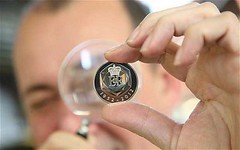
PREV ARTICLE
NEXT ARTICLE
FULL ISSUE
PRIVATE FIRM TO MANUFACTURE QUEEN’S DIAMOND JUBILEE MEDAL
In the tradition of Matthew Boulton, Birmingham manufacturer Worcestershire Medal Service competes with and sometimes bests the Royal Mint. The small company has been awarded the contract to produce 450,000 medals of the Queen's Diamond Jubilee. Here are excerpts from a great article in The Telegraph - be sure to read the whole thing online (and yes, I know they spelled Boulton wrong...)
-Editor
Phil McDermott, a 51-year-old from Birmingham, has stayed rather truer to the dreams of his youth. When he was nine, he started collecting medals. Forty-two years later, he has landed a £7 million contract to make 450,000 medals for the Queen’s Diamond Jubilee next year. Worcestershire Medal Services, the small firm McDermott set up with his former wife in 1988 with a lump sum of £120, beat off competition from a stunned Royal Mint, which was founded more than 1,100 years ago. “This has caused one hell of a shock,” an insider recently told the Telegraph’s Mandrake column. McDermott looks a little shocked himself. “It’s amazing,” he says in a soft Brummie accent, showing us round his factory in the city’s jewellery quarter. “I can’t believe I’m sat here making the Queen’s Diamond Jubilee Medal.” It’s a fascinating story that touches on family as well as global history: a small regional business thriving in the face of globalisation, with a smattering of heroism, stoicism, two foreign coronations and a cameo appearance from Take That thrown into the mix. “My mother thought the hobby would be a five-minute wonder,” says McDermott. Soon, however, he’d amassed quite a collection, including his uncle’s and his maternal grandfather’s from the First World War. Friends donated more. He wrote a book about the Distinguished Conduct Medal. For him, the motivation was never profit – although he has an amusing anecdote about a friend discovering an Order of St Michael and St George, worth around £450, in a pub garden, and another picking up four rare gallantry medals for £1 each at a Scout jumble sale. “I’m much more interested in the story behind a medal,” he says. In 1988, bored by his career in IT and emboldened by the government’s Enterprise Allowance Scheme, which gave entrepreneurs £40 a week to start a business, McDermott founded the Worcestershire Medal Service. Initially, its main work was mounting medals for soldiers to wear with their uniforms. “I thought the business would last about five years,” he says. “I hadn’t counted on the first Gulf War.” Yugoslavia followed. Then Afghanistan. Iraq. War, it seems, is not just good business for arms manufacturers, mercenaries and John Simpson. Each time a soldier gets another medal – a dozen is not now unusual – they have to be remounted. Miniature versions are made for mess dress and black and white tie. “It’s a huge market,” says McDermott. In 2004, he bought Gladman & Norman, a well-established Birmingham factory, and started manufacturing his own medals. In January 2008, it became one of four main companies, including the Royal Mint, to make OBEs and MBEs. It also started making medals for the Kingdom of Jordan, which led to a commission to mark the coronation of the King of Tonga. McDermott was invited to his birthday party. “White tie in Tonga in June…,” he sighs, puffing out his cheeks. At the King of Tonga’s coronation, he met the sister of the future King of Bhutan, as you do. He had his own coronation on the horizon, so McDermott made around 1,500 medals, including the wonderfully named Order of the Druk Gyalpo. There was also a commission from an unnamed royal family for a celebratory medal studded with diamonds. Was it Dubai? Abu Dhabi? Brunei? “I can’t say,” says McDermott, smiling. Meanwhile, back at home, the company was commissioned to make a medal for one of Take That’s music videos. More soberly, it designed and manufactured the Elizabeth Cross, a new medal commissioned in 2009 to honour the families of Britain’s war dead. Earlier this year, McDermott was miffed when the Royal Mint beat Worcestershire Medal Service to the contract for the Olympics. He has got his revenge now, though, and is particularly delighted that it is a success story for Birmingham. The volume of work is such that he is sharing it with other companies in the city, which will help with the soldering, plating, cleaning, casting and hanging. “This town has a long tradition of producing medals – right back to Matthew Bolton, in 1805, who gave medals to survivors of the Battle of Trafalgar,” says McDermott. “Birmingham has been hit hard by the economic climate, and the jewellery quarter in particular. Nearby Lozells [an area of west Birmingham] has the highest rate of unemployment in the country.” McDermott is taking on four extra staff to add to his existing workforce of 22. Worcestershire Medal Service and its friends have to deliver 450,000 by February 6, the anniversary of the Queen’s accession. “I don’t think anyone has ever delivered so many medals in such a short timescale,” says McDermott. “It’s the biggest medals contract that has been put out by the government since the end of the First World War.”
To read the complete article, see:
Medals: from collecting them to making them
-collecting-them-to-making-them.html)
The Numismatic Bibliomania Society is a non-profit organization promoting numismatic literature. See our web site at coinbooks.org. To submit items for publication in The E-Sylum, write to the Editor at this address: whomren@gmail.com To subscribe go to: https://my.binhost.com/lists/listinfo/esylum All Rights Reserved. NBS Home Page Contact the NBS webmaster 
|
